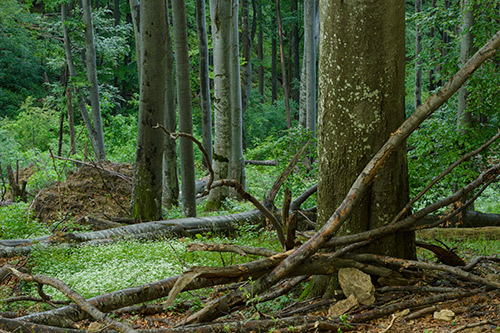++New report shows: virgin forests don’t get included in the National Catalogue++Authorities block or lose studies and willingly prevent the protection of Romanian forests++

Untouched beech forest in Romania
© Matthias SchickhoferBukarest / Radolfzell. The failure of Romanian Government to protect the country’s remaining virgin forests following 21 years of resistance and hesitation is starkly revealed in a report, "Failing our Last Great Forests", released today by Agent Green and EuroNatur.
The report analyses data related to Romania’s “National Catalogue of Virgin and Quasi-virgin Forests” and uncovers a history of clear dereliction of duty and mismanagement that has directly lead to the logging of Romania’s irreplaceable virgin forests.
The first attempt to preserve these forests dates back to 1999 when the National Strategy for Sustainable Development aimed to preserve at least 400,000 hectares of virgin forests. To date, only 30,062 hectares, or less than 8%, have been protected in the National Catalogue. Agent Green and EuroNatur estimate that at least 110,000 hectares of such forests have been lost in this time.
“This failure of nature protection is not an accident. It highlights a complete lack of political will at the cost of the disappearance, before our eyes, of Europe’s last great forests. Of the few forests protected, many are the result of formal complaints to Forest Guards and public scandals we made in the mountains of Semenic, Tarcu or Godeanu, forests like Cosava Mica, Higeg, Hidigel, Radoteasa and others”, says Gabriel Paun of Agent Green.
The report unveils details of 24,260.56 hectares of virgin forests for which NGOs and scientific organisations, invited by the Government, have authored and submitted for inclusion in the National Catalogue. Incredibly, these studies, representing 80% of all studies submitted, have been either rejected, blocked, returned, and, in the most perverse of situations, lost by the authorities at various stages of the listing process.
- Total studies submitted (hectares): 30,335.96
- Total areas rejected (hectares): 8,890.76
- Studies sent back for elaboratoration (ha): 10,543.78
- Studies still being analysed (ha): 769.78
- Studies lost by Guards or Ministry (ha):4,056.22
- Studies accepted in the National Catalogue (ha): 6,075.42
It must be noted that scientists have undertaken painstaking research over long time periods of time, often working in difficult remote locations at substantial cost, to submit their work for approval. That their studies have even been lost by Romanian officials is contemptuous of their profession.
Correspondence with Romanian officials has revealed a stark contrast in numbers of reports received and acknowledged between different government entities. The Ministry for Environment claims they have only received studies for 42 forest areas relating to 9,382.70 hectares. Romania’s Forest Guard acknowledges acceptance of studies for 105 areas covering 24,260.54 hectares. No explanation is given for the inconsistent data.
“We are dealing with a Bermuda Triangle syndrome in Romania. The virgin forests are disappearing. For example, ancient forests of Coltii Balei in Buzau county were originally accepted to be part of the Catalogue but all evidence of their existence has simply disappeared”, added Paun.
“The approval process for the “National Catalogue of Virgin and Quasi-Virgin forests” has been grossly unprofessional and abjectly mismanaged. Temperate Europe’s last large tracts of primary and old-growth forests deserve the highest level of protection and caution. Time is of the essence for their survival, yet bureaucratic hurdles and severe mismanagement reveal a systemic lack of both care and seriousness regarding the protection of Romania’s unique forest heritage. The responsible officials have clearly failed in their roles to protect forests within the Catalogue”, said Gabriel Schwaderer of EuroNatur.
EuroNatur and Agent Green call on the Romanian Environmental Ministry to immediately preserve all remaining primary and old-growth forests. At a time when Romania is the subject of an infringement with the EU regarding the loss of primary forests in Natura 2000 sites, this is the first step to remedy this disastrous situation. This would also help Romania meet its obligations under the Convention on Biological Diversity and contribute to upcoming EU wide conservation targets of strict protection of 10 % of terrestrial and marine ecosystems.
Background information:
- Read the report Failing our Last Great Forests
- The campaign “SaveParadiseForests“ aims at protecting the most valuable old-growth forests of Romania. It is jointly coordinated and carried out by the NGOs EuroNatur (Germany) and Agent Green (Romania).
- The PRIMOFARO report (PRIMary and Old growth Forest Areas of Romania) by EuroNatur and Agent Green shows that Romania still host more than 525.000 hectares of old growth and virgin forests, more than any other EU member state (outside Scandinavia).
Press contacts:
EuroNatur: Anja Arning, anja.arning(at)euronatur.org, Tel.: +49 (0)7732 - 92 72 13
Agent Green: Gabriel Paun, gabriel.paun(at)agentgreen.org


